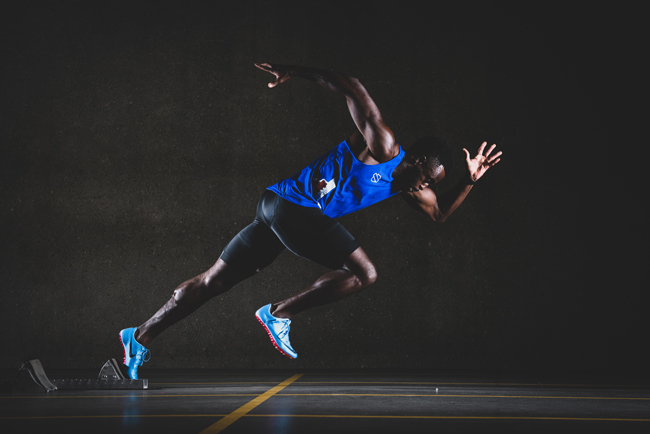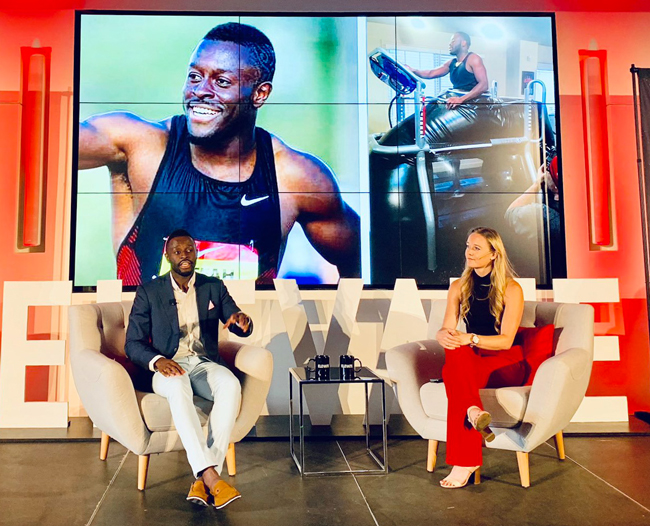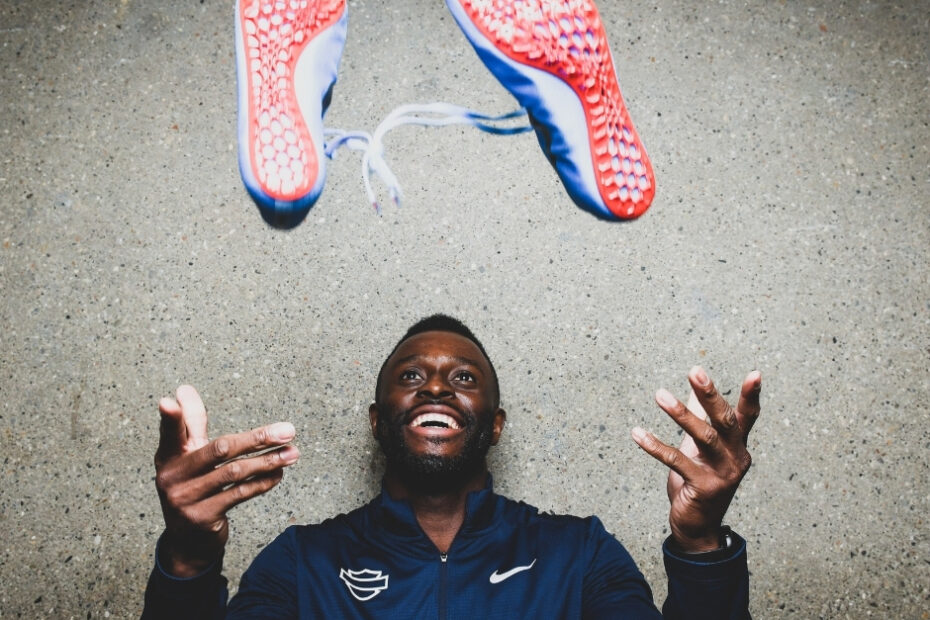Photos courtesy of Candice Ward.
The workout, even a year and a half later, remains vivid. For not only had it been splendid, it was timely.
An ideal combination for a primetime performer.
March 13, 2020, Sam Effah had hammered through a speed-endurance workout on the Olympic Oval’s track. Five times he dashed 200 metres.
This was a sparkling display — with the Olympic trials on the horizon.
He remembers well. “I felt great.”
The Calgary sprinter’s motivation had been crystal clear. To race in Tokyo — and dodge the misfortune that ambushed his previous attempts to get to the Summer Games.
Leading up to London 2012, Effah had wrenched his left quadriceps at a Diamond League event in Italy and returned home. Weeks later, he fell short at the Olympic trials. Disappointing, of course, but he was only 23 years old.
Leading up to Rio 2016, with labral tears in both hips, he underwent an operation on the left side. “Not that it absolutely required surgery, but it hurt to sit, it hurt to twist, it hurt to even cough sometimes.” His chances of qualifying? Ruined.
Once again.
No matter. Effah stayed in hot pursuit of the Olympic dream. Third time’s a charm, right?
With Tokyo in mind and his hips strengthed, he qualified at the 2018 Commonwealth Games and put himself back in the national picture.
Further proof of the young man’s progress?
That memorable training session at the Oval. But Effah and coach Les Gramantik had had little time to savour the excellence that day — Friday the 13th of all things.
By Monday, the world changed. Because of the pandemic, the status of the Olympics was suddenly in the air and everywhere elite athletes, who plan for every contingency, were stunned.
“You never actually think the Games you’re training for are going to disappear,” said Effah. “That was a massive eye-opener. Do I just keep training and hope they come up with a new date for the Olympics? Do I go find a job? So many things were up in the air. It’s a bit scary.”
With the announcement that the Tokyo Games were being pushed a year down the road, the trials for Canadian hopefuls got rescheduled for June 2021.
Effah, meanwhile, had moved back to Toronto. With facilities off-limits, he made do, sweating it out in parking lots, green spaces, wherever. “It was absolutely wild.” To ramp up for the nationals, he relocated to Florida — “a bit of a last-ditch effort” — to fine-tune with runners there.
Returning to Canada in late-May, he got “stuck” in a strict two-week quarantine in Windsor, Ont.
Then came the gut-punch. He learned he had 10 days to post a qualifying time in the 100 metres to earn an invitation to the trials. Mired in non-negotiable isolation for 14 days, Effah had run out of time.
It was over. Hard luck, for the third time, had found him.
Acknowledging “accountability and onus,” Effah adds that the latest letdown carries a different vibe. “This weird abrupt ending. I was like, ‘Well, I guess I’m not even getting a chance.’ That was the reality of the situation. That was a really hard pill to swallow. In my mind, it was, ‘My goal is to get to nationals and perform there.’ But if you can’t even get there? Super disappointing.”
From June:
Hey Twitter family. I’m super appreciative of the messages that have come through over the last few days, thank you. Unfortunately, I was not selected to run at the Olympic trials this week.
— Sam Effah (@Sam_Effah) June 25, 2021
My thoughts here (🎥) pic.twitter.com/awkasLKHT7
Yet, during a conversation the other day, he makes no play for pity. Rather the spin on a remarkable running career is one of sincere appreciation for the goals that did get fulfilled.
“From everything I’ve gone through, I reflect on why I started this whole thing,” said Effah, 32. “Seeing how this goal has evolved … I want to beat my big brother in a race to I want to be the fastest in northwest Calgary to I want to be the fastest in Calgary to I want to be the fastest in the province to I want to be the fastest in Canada. I did all those things.
“Then to want to be the fastest man in the world. No, I didn’t do it, but I have so much to be proud of.”

Growing up in Hawkwood, Effah participated in no organized sports. Unless chasing around his older brothers counts.
At Sir Winston Churchill High School, he played football, operating as halfback, slotback, punt returner. “Anything that had to do with grabbing the ball and running, that was essentially me.”
Yes, Effah could fly.
With little training — and while wearing baggy basketball shorts — the kid won the Grade 10 sprint at the Alberta high school championships. In Grade 12, provincials conflicted with grad. He opted to tug on a tux. “An easy choice.”
But his raw ability hadn’t gone unnoticed. Brenda Van Tighem, a local coach, told Effah: If you train, you can do something big.” Seed planted, he decided to give sprinting a chance. As a walk-on at the University of Calgary, he made the track team. “The rest is history.”
But not without a significant recalibration of his habits. Learning how to get the most out of his body, improvements were rapid.
As a freshman, he won national medals. As a sophomore, he won the 60-metre title. “So I was the fastest man in university.” The next year, he set the U Sports record — which still stands — and, at the world championships, raced against Usain Bolt.
It was all happening for him. “I was that guy,” said Effah. “I was making national teams. It was an absolutely amazing experience, but unexpected that it would happen that fast. But I just embraced it and I loved it. Almost every year I would run a personal best. It was a steady progression.”
And not just according to the stopwatch.
He went from a lad who was terrified to do presentations in front of his marketing class to the stud who was comfortable racing in front of 80,000 fans.
Named Canadian university’s top male track athlete for four straight years — along the way earning endowments from the Calgary Booster Club — Effah doesn’t downplay the transformation.
“It forced me to be more outgoing,” he said. “I was shy from kindergarten all the way up to, honestly, first- and second-year university. When I say shy, I never wanted to be the centre of attention. I never wanted to be this person on TV. I wanted these careers — being an Olympian, being a professional athlete — but I didn’t realize with all of that came all this attention.
“But I agreed to embrace it, because I knew it was part of the game. If you don’t embrace it, you’re not going to have fun.”
Especially among sprinters, the track is the stage for swagger, a place for chest-puffed strutting, intimidation even.
None of that is part of Effah’s package.
Performing at the sport’s highest levels, he prides himself on being approachable. In other words, not at all like “a well-known Canadian athlete,” who snubbed the teenaged Effah following their race in Edmonton. All the youngster wanted was a handshake.
“And he didn’t acknowledge me in any way,” Effah said. “I just said to myself, ‘Man, if I ever make it to that level, I don’t want anybody to feel this way.’ So I’ve always kept that mindset — no matter how successful you are, just be you.
“We’re literally just running in a straight line — it’s not that serious.”
Nor is it forever.

When asked about his current interests, Effah pauses, possibly because the list is so lengthy. “I have a lot of things on the go outside of track.”
Over the years, he’s pieced together a rather plump portfolio.
To which a new line will soon be added. Next month, he graduates with a master’s degree in Management, Innovation, Entrepreneurship. Through Game Plan — an educational program created for national-team athletes — he’d earned a scholarship to the Smith School of Business at Queen’s University.
“I wanted to be able to avoid that deer in the headlights sort of thing when your athletic career is done,” said Effah, who’d already earned a Bachelor of Commerce from the U of C. “Like in anything in life, you can’t put all your eggs into one basket. Because if that thing is taken away and you’re not prepared? Then it obviously makes it a lot tougher.
“That discovery phase, when you’re actually looking to see what you’re passionate about, you need to take time to do that. You can’t just jump into the next step of your career.”
For years, he’s been involved with RBC Olympians, doing work with youth through the Future Launch initiative. Since November 2020, he’s pitched in with RBC’s Social Impact team.
“Now I’m getting experience,” he said. “With all the unpredictability, now there’s some semblance of control.”
He is also a poster boy for Classroom Champions, a Calgary-based education program founded by Steve Mesler. “He’s somebody who’s taken me under his wing,” Effah said.
Certainly Mesler — gold-medal bobsledder from Vancouver 2010 and successful business leader — understands the realities of transition, from clock-beater to clock-puncher.
“When you get to mentor somebody who’s as eager and hard-working and respectful as Sam is, it’s fun,” said Mesler, who’s known Effah for more than 10 years. “The most impressive thing about Sam is that he fundamentally understood, as he was going through his career, that he could do both — being fully focused on sport, while being a part of other things.”
It’s the kind of attitude that led Effah to apply for the 2019 season of The Amazing Race Canada, the country’s most popular reality show. It was an opportunity to test himself and raise his profile during an off-year of the Olympic cycle. In short, to take advantage of the platform.
“This whole sport thing could be gone in a blink of a second,” said Effah. “I want to not only build my brand, but I want to be able to leverage everything I’ve done in this sport.”
Partnered with fellow track star Sarah Wells — an Olympic 400-metre hurdler — they survived all 11 legs of the show, making it to the finale, and settling for second (with Effah sporting a Classroom Champions T-shirt).
“It challenged me mentally, physically, emotionally.” For instance, being terrified of heights and standing on a bridge in Nanaimo, B.C.
“Experiences like that? I was, like, ‘Wow.’ I was this kid who couldn’t stand up in front of my class and now I’m being pulled off a bridge on national TV,” said Effah. “A big part of an athlete’s journey is that person’s story. Being able to tell people that I’m more than just an athlete, running from Point A to Point B. Being able to tangibly help youth across the country.”
During the airing of the show, he was mentoring five classrooms’ worth of students through Classroom Champions.
“Seeing kids who didn’t believe they could be successful and then them seeing me struggle through these obstacles,” said Effah. “After the fact getting to talk to them, ‘You can do whatever you want,’ became more of a purpose as opposed to winning, winning, winning.”
The way Effah carries on, insightful and good-natured, it’s easy to forget that this is one wickedly fierce competitor. Asked to describe an average day of training for an elite sprinter, he wonders if he could instead discuss the workout he misses most.
These sessions, Effah says, took place at the Toronto Track and Field Centre, annually from January till March — always on Wednesdays. The fastest gents in Canada, a half dozen of them, would congregate and race “full out” 250 metres — three times with only two-minute rests. A curious distance? “If you can do a 250, you can do anything. You’ll be a person of steel.”
Bragging rights were on the line. No small thing, considering the quality of company.
“I would make sure I was in bed at 8 p.m. because the next morning … it was like a battle,” said Effah. “You basically went there to prove yourself. If you couldn’t, you were like, ‘I want to be that guy next Wednesday.’ We would run those 250s like our lives depended on it. You’d have hamstring cramps, people down on the floor, sometimes throwing up.
“That was my favourite. Brutal.”
Bushed, they’d then trudge dutifully to the weight room to continue the day’s training. So, never question the investment.
For Effah, that trademark enthusiasm extended to education, to work experience — to the big picture. This seems like a textbook approach by athletes, being prepared for every eventuality, including retirement.
“But he’s not textbook. He is the outlier — he is how the textbook should read,” said Mesler, chuckling. “He’s so far ahead of the game, he’s so far ahead of where I was. Maybe he didn’t reach the athletic peak that he’d really hoped and wanted … but whether you succeeded or not is a minute in time. The process to get there is 20 years.”
That message’s thrust is not lost on Effah, who, as a presence, is much more than a screen-grab of race results.
“Sometimes you have to look back at the journey and see how you’ve grown,” he said. “To be this person I never would have imagined as a young kid. But here I am doing it. So not making the Olympics, yeah, that sucks. But being an athlete is bigger than getting on the podium and getting medals.
“It’s about being able to make your mark. And it’s not over.”
